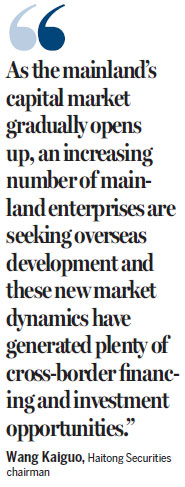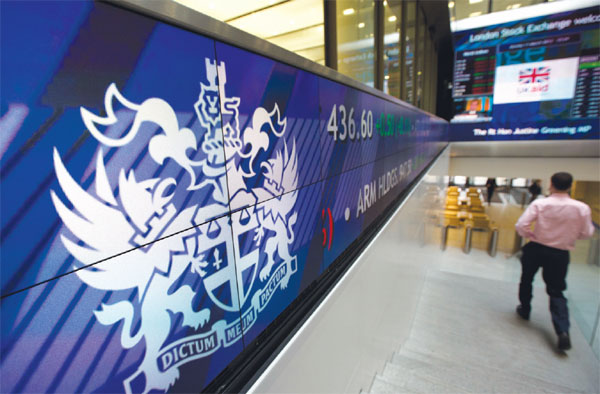The UK connection for investment
Updated: 2015-06-18 07:45
By Oswald Chan(HK Edition)
|
|||||||
London Stock Exchange Group is seeking to boost its business ties with HK and Chinese mainland bourses to tap growing potential of one of the fastest ballooning equity markets in the world. Oswald Chan reports.
London Stock Exchange Group Plc (LSEG) on June 15 announced it has received regulatory approval from Hong Kong's Securities and Futures Commission (SFC) to allow Hong Kong-based financial firms to become London Stock Exchange's (LSE) members.
LSE membership allows Hong Kong stock brokers licensed by SFC to trade directly in some of the world's largest and most well-known companies listed on LSE. According to the agreement, Hong Kong stock brokers can also engage in derivative contract trading in UK securities and trading in global depositary receipts.
"As members of LSE, Hong Kong firms will be able to offer their customers access to the most liquid European market," LSE Chief Executive Officer Alexander Justham said in a statement. "We are excited about the increasingly strong relationship being forged between these two exceptional global financial centers."
LSE added that the exact timing of the implementation is not confirmed yet because details regarding how Hong Kong stock brokers can apply for LSE membership are not finalized.
"The stock exchanges of London and Hong Kong are not competitors (but) rather they are collaborators to provide more choices for international investors," Justham said in the press briefing held in Hong Kong detailing the LSEG/SFC agreement on Monday.
"The LSE is proactively capitalizing on expanding business connections with mainland equity markets. Besides Hong Kong stock brokers, we also hope mainland stock brokerage companies can participate in trading of LSE-listed securities and derivative products," Justham added.
"We believe some kind of linkage mechanism can connect LSE and the mainland capital market in the future, though the Shanghai-Hong Kong Stock Connect model may be technically difficult to replicate (because of) the time zone difference between London and the mainland," he noted.
The mainland A-share market is the second-largest equity market globally. Although its market capitalization of $5.2 trillion (representing 8 percent of total global equity capitalization) is substantially less than the $24 trillion market capitalization in US, A-share daily market turnover in January this year reached $85 billion, exceeding the $68 billion daily turnover in the US equity market, according to a report of Bank of America Merrill Lynch (BAML).
Highlighting the importance of the A-share market, a BAML report notes that A-share market exposure can provide diversification benefits for global investors because of the low correlation between A-share market and other equity markets in the world. The correlation between A-share index and MSCI All Country World Index in 2014 was only 5 percent, indicating the fluctuations of these two indexes would not seriously jeopardize the equity portfolio values of international investors.
Just five days before signing the SFC agreement, LSEG inked a memorandum of understanding (MOU) with mainland securities company Haitong Securities Co Ltd to establish mutual cooperation in areas such as trading of renminbi-denominated exchange funds tracking mainland securities, promoting renminbi-denominated fixed income product innovation, exploring new index futures and other derivative products, and attracting more mainland firms to list their shares on LSE.
"As the mainland's capital market gradually opens up, an increasing number of mainland enterprises are seeking overseas development and these new market dynamics have generated plenty of cross-border financing and investment opportunities," Haitong Securities Chairman Wang Kaiguo said in the LSE statement.
"This MOU is aimed at seizing the opportunities posed by these new market dynamics to better serve clients' needs," Wang added.
There are 57 mainland companies listed on the LSE, with eight companies listed on the Main Market and 49 listed on Alternative Investment Market, which is a sub-market of LSE, to facilitate listings of growth companies, LSE data showed. In the 12 months since June 2014, seven new mainland companies were listed on the bourse.
Apart from equity and derivative product trading as well as company listing, LSE is also poised to play a more proactive role in the offshore renminbi financing business.
In March this year, LSE listed Europe's first renminbi-denominated money market exchange traded fund (ETF), which will be traded and settled in renminbi, pounds and euro. This ETF enables institutional and retail investors to gain exposure to money market instruments which invest in the mainland's interbank bond market.
In the 12 months since June 2014, 10 new renminbi-denominated bonds were issued in London, adding to a total of 32 offshore dim sum bonds, according to LSE data. Six new Renminbi Qualified Institutional Investor ETFs providing A-share market access have been listed on LSE.
LSEG has also inked other MOUs with leading mainland banks, including Agricultural Bank of China, Bank of China and China Construction Bank. These MOUs are aimed at promoting more renminbi-denominated equity products for the London market and helping to facilitate access to London's capital market for mainland companies.
Contact the writer at oswald@chinadailyhk.com

|
The London Stock Exchange is seeking a proactive role in cooperation with Chinese mainland and Hong Kong enterprises in the light of the opening-up of mainland's financial sector. Jason Alden / Bloomberg |
(HK Edition 06/18/2015 page8)
